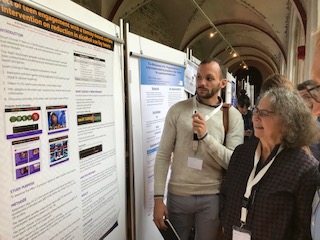
Smart Choices 4 Teens
Three Klein Buendel researchers were part of a team that gave two presentations at the Tenth European Society for Prevention Research (EUSPR) Conference and Members’ Meeting in Ghent, Belgium in September. Dr. David Buller, Dr. W. Gill Woodall, and Ms. Julia Berteletti were part of the Smart Choices 4 Teens research team led by Dr. Brenda Miller from the Prevention Research Center at the Pacific Institute for Research and Evaluation (PIRE).
Smart Choices 4 Teens is an online, interactive, family-based program for parents and older teens designed to reduce teen alcohol use and risky sexual behaviors. The program features three sequential components (parent-teen communication, teen alcohol prevention, and teen romantic relationships) that parents and teens complete separately before working together through a discussion activity at the end of each component. A randomized controlled trial with 411 families found significantly better outcomes for teens in the experimental condition as compared to controls in terms of decreased alcohol use and decreased sexual risk behaviors.
Oral Presentation
Dr. Brenda Miller’s presentation focused on the design of the Smart Choices 4 Teens alcohol prevention component. This module targeted eleven topics: (1) the decision to drink or not drink, (2) social host laws, (3) physical effects of alcohol, (4) signs of alcohol poisoning, (5) social consequences of alcohol, (6) an interactive Blood Alcohol Calculator, (7) myths about alcohol, (8) creating a safety plan for parties, (9) parental influences, (10) refusal skills, and (11) defining a drinking problem. The module incorporated four different activity formats — video narratives, info-gadgets, interactive activities, and structured discussions. Parents and teens engaged in the same materials but did so separately, coming together to choose and discuss hypothetical scenarios that guided the discussion offline. A “nudge” feature was embedded to allow teens to prompt their parent to finish a module and move to the end-of-module offline discussion or vice versa. The nudge feature was used 561 times by 218 users.
Dr. Miller reported that 86% of experimental families began the intervention and 50% of families completed the teen alcohol prevention component. The average time needed to complete the alcohol component was 16 minutes. Parents and teens reported learning new lessons and becoming more comfortable discussing alcohol use together. Barriers to completion included limited understanding of some content and needing additional instructions.
Poster Presentation
Dr. David Buller presented a poster, with analysis led by Dr. W. Gill Woodall, on the effect of teen engagement with Smart Choices 4 Teens. Teens and parents (411 dyads) completed an online baseline survey prior to being assigned to either the intervention or control conditions. Follow-up online surveys were completed 6, 12, and 18 months later. The teen sample was 55% female and 72% non-Hispanic White. The parent sample was comprised predominately of mothers (84.7%).
The Smart Choices 4 Teens website tracked duration of time spent using each of the web-based components. In an analysis of teens who completed the program in the intervention group (n=142), linear regressions tested duration of teens’ time in each online component in the entire program as predictors of teens’ past 30-day alcohol use at the 6-month follow-up. More time spent by teens using interactive activities negatively predicted later alcohol use, as did teens’ time spent viewing videos. Also, teens’ time spent using info-gadget activities had a negative relationship with alcohol use.
The researchers report that activities with interactivity, animations, and video content may produce stronger preventive effects on alcohol use because teens prefer this format over written text in the info-gadgets, have more involvement with them, and/or find characters relatable. These reactions may stimulate deep processing of prevention content.
The Smart Choices 4 Teens research was supported by a grant from the National Institute on Alcohol Abuse and Alcoholism (AA020977; Dr. Brenda Miller, PIRE, Principal Investigator). Other authors on Dr. Miller’s research team included Dr. Hilary Byrnes, Ms. Veronica Rogers, and Dr. Joel Grube from PIRE; Dr. Beth Bourdeau from the University of California San Francisco; and Dr. David Buller, Dr. W. Gill Woodall, and Ms. Julia Berteletti from Klein Buendel. Smart Choices 4 Teens was programmed by the Creative Team at Klein Buendel.
